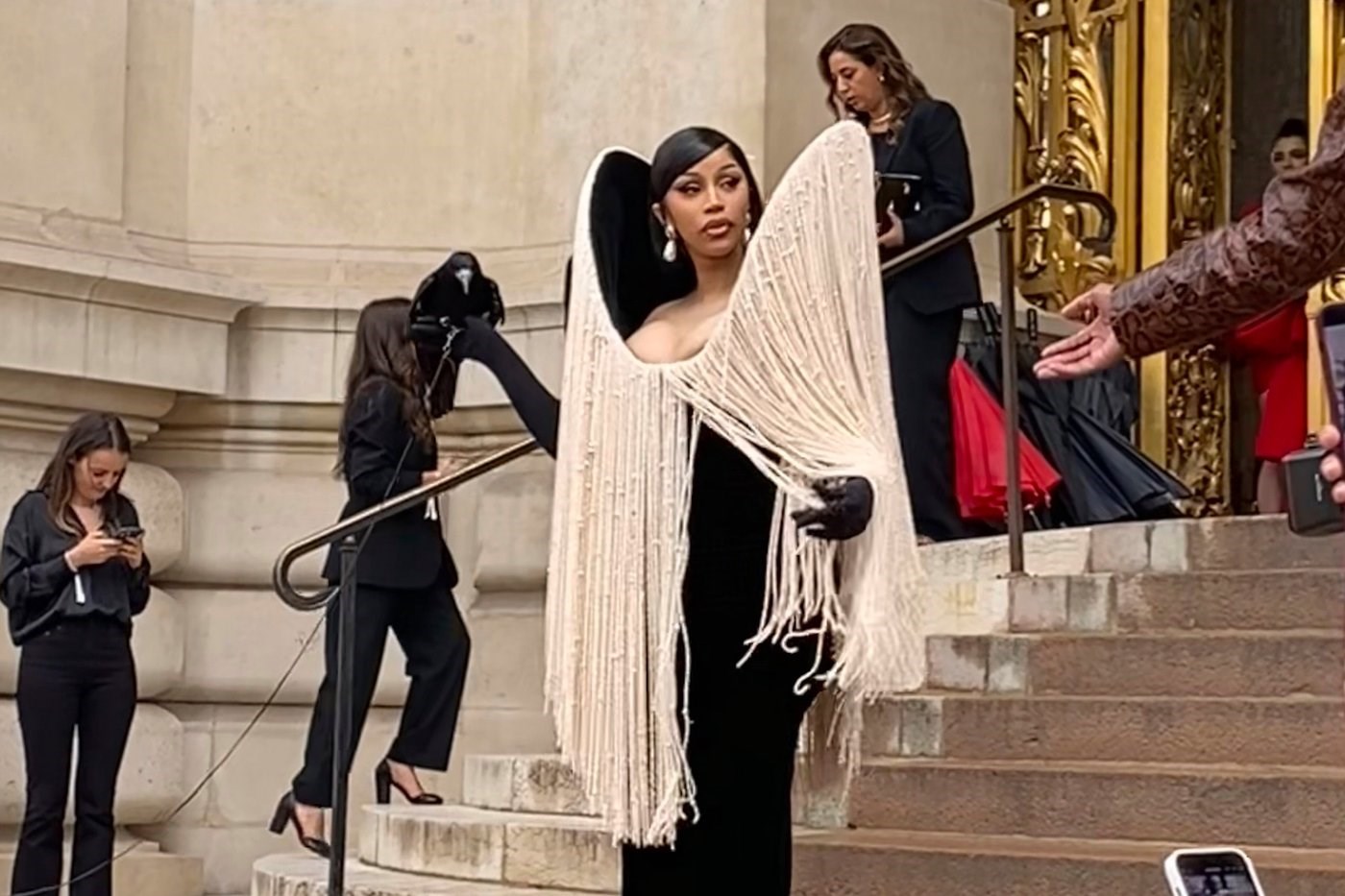
Cardi B holds a crow at Schiaparelli's Fall-Winter 2025/26 Haute Couture show in Paris, Monday, July 7, 2025. (AP Photo/Thomas Adamson)
Republished July 07, 2025 - 10:43 AM
Original Publication Date July 07, 2025 - 5:11 AM
PARIS (AP) — Paris couture week opened Monday not with sequins or red carpet pageantry, but with the surreal sight of Cardi B and a live crow.
Wrapped in a custom Schiaparelli gown of graphic fringe, the U.S. rapper stood beneath the gilded columns of the Petit Palais, holding the black bird on her arm. Her avian plus one squawked, glared and nearly lunged — setting the tone for a monochrome show that itself soared straight into the surreal.
It was perhaps a fitting image for Schiaparelli. Elsa Schiaparelli, the house’s founder, built her legend in the 1930s by weaving the unexpected — lobster dresses, shoe hats, and, yes, animals — into the heart of high fashion.
That legacy pulsed through Daniel Roseberry’s Fall 2025 collection, a spectacle in pure black and white, staged as if the city itself had been drained of color, leaving only stark contrast and raw emotion.
Inside, the mood was cinematic, and not just owing to the glitzy guest list, including Dua Lipa and Hunter Schafer. Gowns and jackets were defined by intensity and ease, with the waist and hips shaped through unexpected techniques. One sweeping gown undulated, conjuring the ghostly silhouette of a deep-sea medusa. Hints of disco sheen flickered like film across the runway.
But if the house has been criticized in the past for relying on extreme corsetry and body manipulation, this season marked a shift. Roseberry, perhaps heeding the critics, abandoned his signature corset silhouette. In its place: a freer, more elastic exploration of the body, echoing Schiaparelli’s own restless spirit.
Schiaparelli helped create the mold
Roseberry said the collection was inspired by the moment in 1940 when Elsa Schiaparelli fled Nazi-occupied Paris for New York — a period “when life and art was on the precipice: to the sunset of elegance, and to the end of the world as we knew it.”
Here, that tension was alive in every look: archival codes reimagined with a restless push toward the future. Silhouettes veered between sculptural and fluid, with foulards stitched from measuring tapes and Swiss dots in silk thread — a nod to Elsa’s era, crafted using century-old techniques.
Yet the show was more than spectacle. This was couture at its most essential — an ideas factory for the entire fashion industry, unfettered by trends.
“Chanel was interested in how clothes could be of practical use to women; Elsa was interested in what fashion could be,” Roseberry added.
It is this what-if energy, the transformation of memory, myth, and sheer technique into something never seen before, that keeps couture vital, even as the world rushes toward AI and disposable fast fashion.
The origins of couture
The setting only heightened the effect. The Petit Palais is currently home to an exhibit on Charles Worth, the 19th-century Briton who invented haute couture by bringing artistry and handcraft to Paris.
The symmetry was irresistible: in these halls, Schiaparelli’s past collided with fashion’s future, reminding all why couture matters: not as museum piece, but as living laboratory for risk, reinvention, and radical beauty.
A decade after its relaunch, Schiaparelli has found commercial traction and become a fixture on the world’s red carpets, a rare feat in today’s luxury market. But above all, the brand’s power lies in its ability to surprise. On opening day, as Cardi B’s crow threatened to take flight, Schiaparelli proved that in Paris, fashion’s most potent magic is still the unexpected.
News from © The Associated Press, 2025